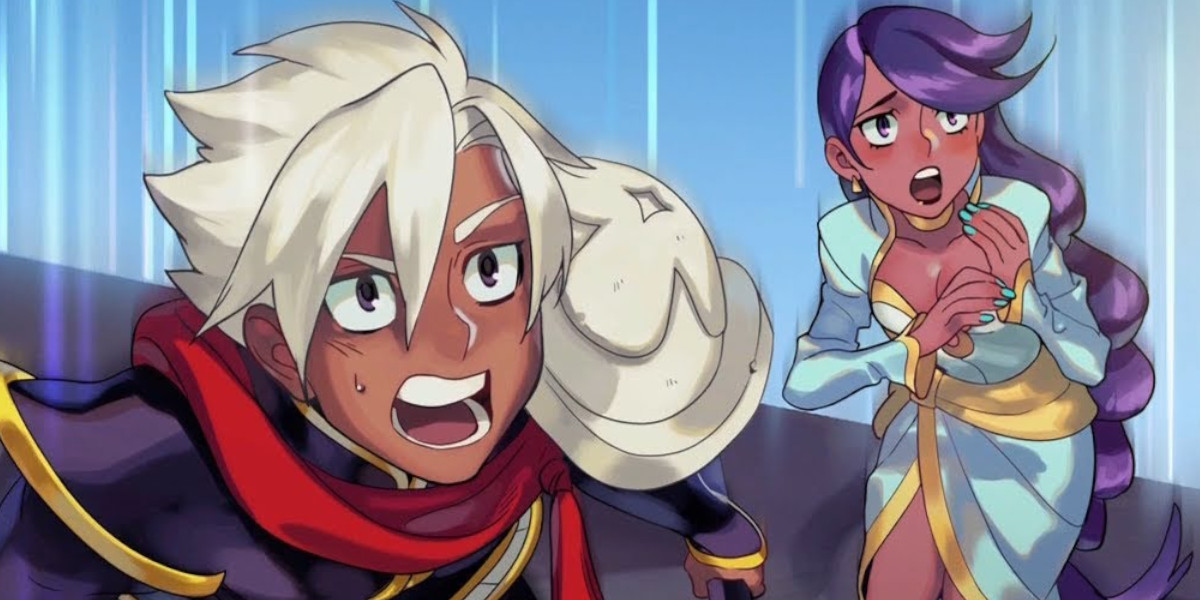A word of warning: this ended up being a very long piece. I got carried away, but I, like Arngrim, have no regrets. Enjoy 🙂
My love for Valkyrie Profile.
This is important, please bear with me…
Valkyrie Profile is a game developed by TriAce and published by Enix, back when Enix was just Enix, in 1999 (21 years old now, Valkyrie Profile can now go to a bar and drink a beer). The game is a classic JRPG with an extremely agile and satisfactory turn-based combat system that allows the player to perform cool combos with flashy VFX, cringe-inducing 2D-3D graphics mashing, and amazing voice acting.
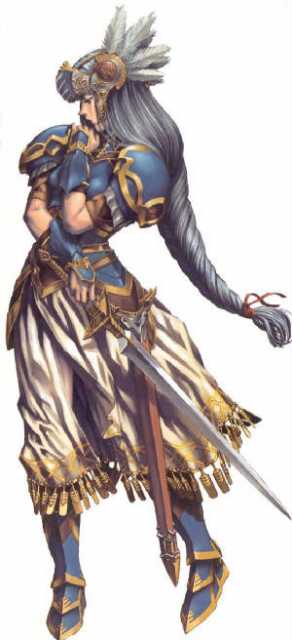
However, the single most amazing feature of VP is its narrative. The game centers around Lenneth, a Valkyrie tasked with traveling the earth looking for tormented heroes in the brink of death. She witnesses their final hours and decides if they are worthy of fighting alongside the gods in the ultimate war: Ragnarok. The game features 24 different characters, each one with a different tragic story, many of them intertwined. The player has a chance to see first hand their stories and relate to each different character and their tragedy before recruiting them.
The game is structured in 8 chapters, in each one you can pick up a few characters and then go with them and clean a few dungeons. Each new character has to be trained, in the hardest difficulty new characters arrive at level 0 and you must level them up if you want them in your party, which sounds troublesome, but I actually found it kind of fun, it’s a chance to revisit old dungeons and check what cool abilities the new members of the party have. Before the chapter ends, you have to send at least one hero to Valhalla to fight with the gods, which usually is a tough choice since the heroes you send won’t be playable again until the end of the game, and some heroes may die in the war. At the very end of the chapter, Freya updates you in the state of the war, tells you about accomplishments from your Einherjar (your heroes), and gives you a quick summary of your performance.
The game has 3 endings, the best of which is Japan levels of hard to get, not because the game is hard to play, it’s actually very easy even in the hardest difficulty, but because the order of actions you have to make is super obscure and extremely precise. As far as I remember there’s no clear hint in the game on how to get Ending A. Only the disappointment of finishing the game and getting Ending B (or C if your performance was abysmal and Freya came down to kick your ass).
To get the best ending you have to make some incredibly tear-choking sacrifices amplified by the fact the game acknowledges your progress with new super tragic sections of gameplay and story that will make you feel powerless and angry, followed by a whole new section with higher stakes, and anime cinematics, and a cathartic last fight, and everything. It is freaking beautiful.
In summary, this is one of the best games ever made, second only to A Link To The Past.
But this piece is about another game, right?
In October 2015 Lab Zero Studios launched an IndieGOGO campaign for a game that claimed to be a spiritual successor to Valkyrie Profile. Indivisible showed very similar gameplay, with amazing anime-style art, voice acting, similar combat system, the works. The moment I saw this my heart skipped a beat, I HAD to play Indivisible.
After a fairly successful campaign, the game stayed in production for four years, which I find perfectly reasonable, and finally got published in October 2019. I happily got my copy and played the whole thing with a stupid smile on my face. I think I might’ve burned the midnight oil on this game 4 or 5 times because I wanted to take it to the best completion rate my poor gamer skills allowed me before the end of the holidays. The moment I get back to work I drop whatever game I’m playing *cough*Hollow Knight*cough* because my poor sick old body cannot take too much load at the same time. I didn’t want that to happen to Indivisible, so I made sure to play the most out of it till I properly finished it.
The game is really good, mechanically speaking. The combat system is a little different from VP’s, but not in a bad way. They added some Metroidvania elements to the formula (I’m a sucker for Metroidvanias), with innovative platforming, nice puzzles, quests, and stuff. It’s a good game, well made.
If the game is so good, then what’s the deal with this piece?
The game is well made, almost all of it, except for its writing. Man, I swear the game’s plot had a lot of potential, a lot. If I were to put the story in bullet points, outlining the major events, you’d say I’m crazy and talking BS.
The story has it all, it’s a coming of age tale with tragic twists and turns, characters suffer and get angry, and sad, and happy, bad things happen, good things happen, then you have to face the dire consequences of your careless behavior and acknowledge your mistakes before taking further actions to fix your own wrongdoings and literally save the world. It’s a movie grade plot, with the right actors and director, maybe even Oscar-worthy.
I’m not kidding, the plot is that good, but the delivery, oh boy is it baaaaaaaaad, real bad, it’s so bad I can’t help but to feel sad thinking of how amazingly great this game could’ve been. I truly believe this could’ve been the next Valkyrie Profile if only the script of the game was at the same level as the plot.
WARNING: Massive spoilers ahead, for both games.
What I love about Valkyrie Profile is the narrative, the small stories of every hero and their downfall, how the writers managed to create such engaging characters with very short screen time, and I honestly feel here is where Indivisible fails spectacularly.
For this to make sense I have to give a few examples of both games, so you can compare what I’m talking about. So I’m just gonna give two long and very detailed examples of how both games are written. I hope to make them not painfully boring (I’ll add videos with playthrough in case you don’t want to read that much 😉 ).
Valkyrie Profile and the tragic tale of the berserker and the princess
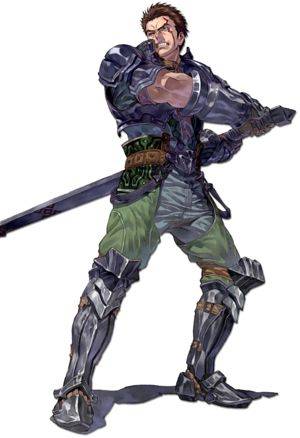
In Valkyrie Profile the first two heroes you pick are Arngrim (based on the myth of Arngrim the berserker) and Jelanda. Arngrim is a brutal mercenary who has no concept of honor, fights only for money and has no loyalty. At this point in the game, it seems Arngrim cares only for three people in the world: His younger brother Roland who appears to be a sickly young boy that never leaves home, a young soldier and pupil of his named Lawfer, and Lawfer’s father who is actually the captain of the king’s guard.
Arngrim serves in a war for the kingdom of Artolia and its prowess in battle is acknowledged by the king himself, who honors him in front of all his army. Arngrim publicly offends and even threatens the king. The king’s young daughter, Jelanda, tries to defend his father and orders him arrested, but Arngrim is so respected and feared by the soldiers no one dares to confront him, he just walks away.
Jelanda, furious for Arngrim’s behavior, concocts a plan to force him to apologize to the king, or at least to her. She disguises herself and presents to Arngrim as “Angela” claiming she has a job offer for him. During the meeting, she accidentally gets poisoned (she drinks a glass of Sake like water) and passes out. Arngrim brings her home with his brother and takes care of her while she’s out. They then find out Angela is actually Jelanda. Arngrim realizes she must be mad for the way he treated her father and she’s maybe trying to get back at him. Moved by the courage of the girl and the fact she’s trying to defend her father’s honor, Arngrim keeps playing along with her deception. He then decides he’ll apologize to her the next day when they meet. But she doesn’t show up.
A few days later Arngrim is hired, along with another guy named Badrach, to escort a carriage to the next kingdom. Halfway there the caravan is intercepted by Artolia’s soldiers who demand to inspect the cargo. Arngrim and Badrach comply and immediately try to escape, but before they can run away they see the soldiers take out Jelanda from the crate they’ve been escorting.
Badrach lets out the contractor is Lombert, the king’s counselor, who also happens to be a spy. Arngrim pieces out Lombert kidnapped the princess and tricked him into delivering her to Artolia’s enemies. Things get worse when the soldiers, following Lombert’s instructions, give the unconscious Jelanda a potion that turns her into a monster and kills them. Arngrim realizes Jelanda won’t survive, and Lombert is to blame for everything. He swears to kill Lombert, but first, he has to deal with the princess turned monster.
Lenneth reveals herself and helps Arngrim kill the monster. Arngrim then marches back to Artolia to kill Lombert for his treason, and to avenge the young princess.
The Valkyrie recruits Jelanda, and she begs her to save Arngrim. Lenneth accepts reluctantly and helps Arngrim fight Lombert who, of course, turns out to be a powerful necromancer. They win, but Arngrim is surrounded by the king’s guard, he is now guilty of murdering the princess and the king’s counselor. The soldiers who admired him previously, now fear he has gone mad and corner him in the palace. He fights as many soldiers as he can until Lenneth appears back and scolds him for his blind pride. Jelanda reveals herself by Lenneth’s side and Arngrim realizes she is safe (her soul at least). Lawfer’s father enters the room and confronts him. Arngrim refuses to fight Lawfer’s father, so he throws down his sword and opts to take his own life. His final thoughts: “I Have No Regrets”.
Lenneth agrees to let Arngrim join her einherjar, but Freya warns her Arngrim is no hero and he will never enter Valhalla.
THAT’S HOW THIS GAME BEGINS!
Now, this fragment is not perfect. I find it believable Arngrim grows fond of the princess since he’s impressed by her courage and honor. Arngrim really questions everything he believes thanks to Jelanda. What I find a bit weird is why Jelanda grows fond of Arngrim since she originally sees him as a brute mercenary who offended her father. But besides that and a few lines with weird voice acting, I like this fragment very much. I love how Lenneth scolds Arngrim and explains to him that heroes are more than just strong bloodthirsty dudes.
If you want to crossreference what I wrote and point me on my errors, here’s a video playthrough with this section of the game.
Now, let’s look at how Indivisible begins, so we can compare the two pieces.
Indivisible and the should-be-tragic tale of the girl, the father, and the soldier
Indivisible starts with Ajna, the main character, who is just getting up and is already late for a training session with her father Indr. Along the way, you can talk to many villagers who let you learn a little about the town and constantly remind Ajna she’s late and her dad will be mad.
Once she reaches the training grounds Indr scolds her and they begin training. She still has a lot to learn and Indr makes sure to tell her. But Ajna is impetuous and doesn’t take criticism very well, she gets angry and starts arguing with Indr about how he never acknowledges her. Indr pushes back and shuts her down and that only makes things worse, Ajna gets even angrier and starts asking about her late mother, who she never met. Indr, attacked and cornered, avoids the whole conversation and leaves Ajna hanging, he just dashes back home.
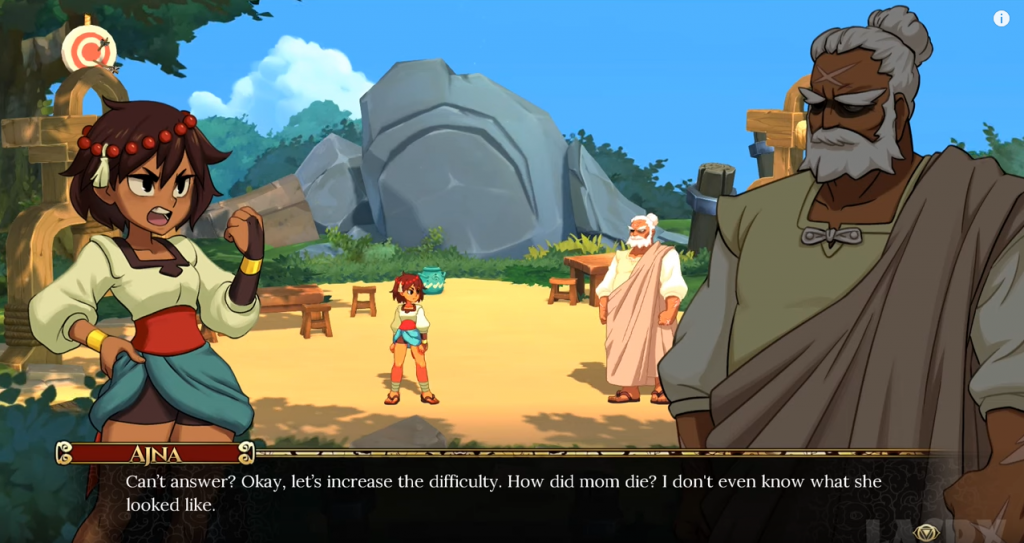
Ajna, of course, is still angry and follows him, but when she reaches the village she finds it in flames, invaded by troops of an unknown army. Dhar, a young soldier in command of the invading force, is fighting Indr and Ajna reaches them in time to hear Indr final words of fatherly pride and love before passing away in her arms. She jumps onto Dhar and they fight, after a few rounds Ajna absorbs Dhar with her mind, a thing that simply never happened before. Both argue a lot until Ajna meditates and finds out she can enter her own mind, which happens to look like a pandimensional eco-resort. Dhar is trapped inside and they quickly find out they cannot fight inside Ajna’s mental realm. Ajna leaves the village in ruins on a mission to kill Dhar’s commander, Lord Ravannavar.
Here it’s important to note that Dhar is now a playable character. That means the guy who just killed Ajna’s father is now a party member.

Just outside the village, she finds Razmi who just burned her own home with a troop of soldiers inside who tried to take her stuff. Ajna and Razmi exchange pleasantries and then Razmi is also sucked into Ajna’s mind. Ajna and Razmi just brush it off like absorbing people into your mind is a completely normal thing people do.

Then you find a dungeon, inside, you find the Axe of Ajna’s mother, a precious item Indr treasured and promised to give Ajna eventually. Lying next the Axe is beside the corpse of a soldier. Dhar finds odd that a soldier of his be this far away from the village. Ajna picks up the Axe and uses it cut down some roots blocking the way.
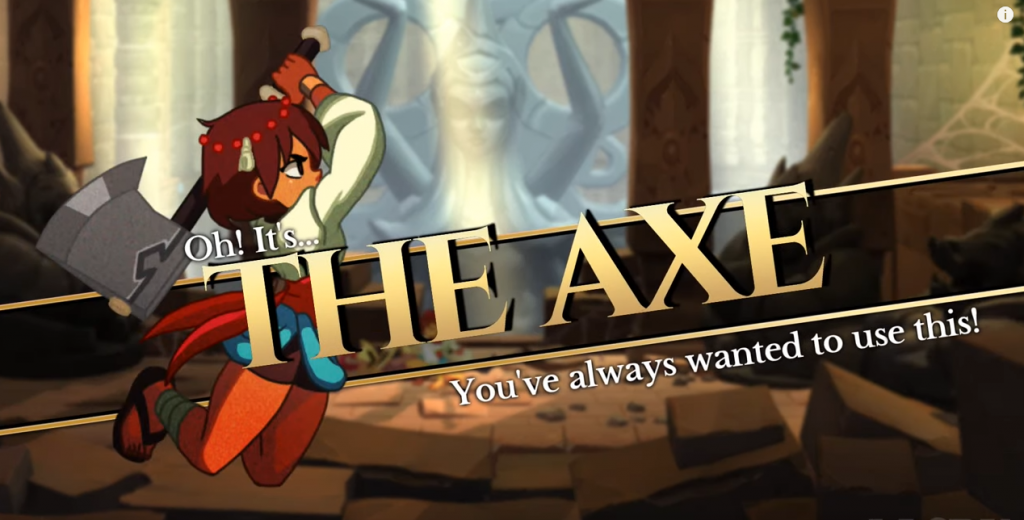
They reach the end of the dungeon, fight a big monster and Ajna discusses with Dhar how this beast is probably what killed his soldier. Dhar feels bad for his man.
Right outside the dungeon, they stumble upon two monks who tell Ajna about a collectible in the game. Ajna absorbs them too and then uses the Axe to climb a wall.
Then they find Gingseng, a very young botany enthusiast, and Honey, a huge turnip with hand-drawn eyes Gingseng carries in his hat. Gingseng tells Ajna he’s looking for Resurrection Lilies, so Ajna absorbs him and they go find the lilies…
I’m going to stop here because Indivisible is not as clearly defined by chapters as Valkyrie Profile, and because I think my point should be clear by now.
Here’s a video of the first hour of gameplay, a bit more of what I just described.
What’s the difference?
I get they wanted to give the Indivisible a lighter tone, but the way the game handles its story is so weird.
In Valkyrie Profile you feel each and every death of the einherjar, they handle the narrative with a lot of respect and give you time to understand what’s going on and process it. Lenneth always reflects back on the events she witnesses, she even intervenes from time to time or discusses with the heroes about their death.
In Indivisible Ajna sees her father die in front of her and suddenly you are in the middle of a dungeon fighting alongside her father’s killer, and an emo witch that’s wearing the skin of her late pet tiger. And don’t get me wrong, I love the characters of this game, Dhar has a very emotive arc, Razmi is simply awesome, and Gingseng is intelligent, loving and loyal. But the game just doesn’t let you digest anything. Everything happens so fast there’s no way to engage with the events.
I think Ajna’s Axe is the best example of this. She finds her Axe just there, lying in the middle of the ground, and kind of picks it up and uses it to break a wall. This moment should’ve been really emotive, it’s the only memento she has of her mother, who she didn’t get to know. But it is not, it just happens and then you keep going forward. Ajna just lost everything and in a second she’s joking with Razmi and helping Gingseng pick up random weeds.
I believe the problem here is the narrative in Indivisible is kinda rushed. In VP the story has a very slow pace, with long scripts and pauses. Even the screen transitions are slow, they take their time to show you the events. While in Indivisible you feel the narrative pushing you forward as fast as possible, there’s no time to breathe. As a consequence, the tone is all over the place, you have very emotional moments followed immediately by a quick joke. Ajna is furious, then sad, then happy, then furious again. And the many times Ajna makes a mistake and someone gets angry at her, everything just resolves quick and clean, everyone says “ok, I’m not angry anymore, let’s be friends again”.
So, how to fix that?
The whole idea of me writing this blog is to get my ideas in order and learn from other projects. There’s no fixing Indivisible, the game is already published and they are doing well. As I said, the game is very well done, it’s a fun game to play certainly. I managed to finish it getting all the incarnations (characters) and getting every single bit of story, upgrades, and lore from it and I really liked playing it.
But still, we can hypothesize how we could fix the story so it works better for a game like this.
Now, I’m not a writer, I mean, I dabble, but I’m not even close to a professional writer, so what I can do is very limited. Someone more capable than me could do this way better (less cliche for instance). So be warned this next section could be an exercise on futility. Here goes nothing:
Indivisible and the hypothetically better tale of the girl, the father, and the soldier.
Let’s keep the first scene intact. Ajna wakes up and walks around her hut, then leaves for the training field happily strolling through the village, with not a care in her mind. When she finally reaches the training field, Indr scolds her for being late, they train for a bit. Ajna gets angry at Indr for not acknowledging her progress and for not talking about her mother. Indr gets all uncomfortable, pushes Ajna away and goes back to the village alone.
When Ajna gets back to the village she finds everything in chaos, an army is invading, everything is in flames and Dhar is fighting Indr. Ajna reaches just in time to catch her father’s final breath.
Here’s where I begin to change the script.
Dhar has accomplished his mission: To destroy the village and kill their chief. So he leaves and his unit is left behind cleaning (killing everyone that’s left). Ajna holds her father’s inert body and sobs. Sadness gives way to anger and she cries in fury as Dhar’s men approach.
Ajna fights a few men, then remembers about the Axe. She goes to her hut, now in ruins, and retrieves the Axe. Ajna takes a second to think about her mother and reflects on how her mother’s weapon will help her avenge her father now, she then goes after Dhar, fighting his men as she pushes forward.
Just outside the village, she finds Razmi under attack. Ajna joins the battle and together they defeat their foes. Razmi is now homeless and angry. Ajna pushes forward and Razmi follows reluctant but grateful. “Great, now I’m in debt with you. I don’t like owing anything to anyone so I’ll help you kill this guy and we’ll be even. Besides he also has a score to settle with me.”
I’d take full advantage of the dungeon ahead, set the tone, make the music more intense and fill the place with soldiers from Dhar’s unit. And most important of all, I would not use the “sucked into my mind” thing just yet.
Ajna and Razmi advance through the dungeon, in a frantic section of fighting and platforming chasing after Dhar. I’d make sure there’re many enemies here, but make them easy to kill, quick fights to help the player get the hang on the fighting system. Finally, they catch Dhar at the end of the dungeon. Now the player knows how to fight and since we’ve pushed the player through the dungeon, they had time to process Indr’s death and they are now as angry as Ajna. I’d make the fight with Dhar a really even one, and use every resource available to make it last a bit longer, a good boss fight to help increase the tension. Once Dhar is low on health cue a cutscene where Ajna explodes in rage and she absorbs Razmi, Dhar, and herself into her mental realm.
This is a good moment to take a pause, I’d put Ajna in a black empty space for the first time, make the player run around in the dark for a few seconds. Then reveal a mini-dungeon here, with a very surreal design, driving a metaphor for her mental realm forming out of chaos. She finds Dhar first and they resume fighting, but Ajna is angry and confused, her anger manifests as a big demon that now attacks both of them. I’d use the design of this foe to foreshadow the monstrous form Ajna adopts mid-game. Ajna and Dhar are forced to fight together against this monster. I’d make sure Dhar is really op here, so the player gets hooked on the idea of having him as a playable character.
Ajna and Dhar defeat the big monster. Once the dust settles Dhar runs away. Ajna is angry, lost, and confused. She keeps moving forward and finds Razmi who is freaking out. Razmi lashes at Ajna and they both make catharsis. Let this be an opportunity to show off their personalities. Ajna is intense and naive, she’s in terrible pain right now and doesn’t understand what’s happening. Razmi, on the other hand, is more restrained, she’s also clever and with a dark sense of humor. So I’d make Razmi really angry at first, but when she sees Ajna react in a more emotional way, I think Razmi would switch from angry to unsettled and would try to defuse the situation by trying to comfort Ajna awkwardly. Since Razmi is a shaman it’d be perfectly reasonable for her to understand that they are trapped inside Ajna’s mind and maybe hint Ajna that she should meditate to assert control of the situation.
Ajna manages to calm down and her mental realm rearranges into the beautiful grotto. After a few more dialogs, Ajna exits to the material world. Now Ajna is in a more stable frame of mind, so she can display a more jolly disposition as she discusses with Razmi how she and Dhar are both trapped inside Ajna’s mind. They then reach an agreement. Razmi has nothing better to do, so she agrees to keep an eye on Dhar, who, now a prisoner, agrees to guide them to Ravannavar’s fortress. And we are back in sync with the game. From here the game could show the scene with Gingseng and handle more graciously the exchange with the monks.
This would be my proposition to fix the first half-hour of the game. Not only the script changes, but the pacing for this whole section should be slower. Once Ajna exits her mental realm for the first time she’s had time to process what happened and literally dealt with her inner demons. Razmi also adopts in a more clear way the supporting role she has during the rest of the game.
A few quick notes for the rest of it
I’d deny the player the chance to play with Dhar for a while, at least from this point to the first encounter with Ravannavar. Dhar is a prisoner, he has no motivation to help Ajna in her journey, for all he knows if Ajna dies he might be able to escape. I’d also make sure to have Dhar talk from time to time about Ravannavar, have a dialog where he explains how he’s an orphan and Ravannavar is like his father. This way Ajna could confront Dhar on how he killed her father and thus she will kill his. The whole “my father doesn’t know who I am” comes a bit out of nowhere in the game, there’s little to no setting of the relationship between Dhar and Ravannavar.
That way when they do face Ravannavar for the first time and he disregards Dhar, it’s a bit more clear why Dhar would get angry at him. Here I’d force the player to push Dhar into the party and make them fight together against Ravannavar. At this point, Dhar should be at the same level as Ajna, but since we teased him previously to be a really op character the player will most likely want to play with him. This will also give Dhar’s arc a bit more of nuance since Dhar is a really odd character. He’s like a fanatic but at the same time a very reasonable guy, he has no real turning point, which feels weird.
With Ajna, I’d make her reflect more on the losses she’s suffered. I’d make a secluded corner in her mind space with a symbolic gravestone for Indr. If the player goes there, I’d let them interact with it by making Ajna talk to it about what’s happening (asking her late father for advice), or just by making her contemplate the memorial in silence. This will give an opportunity later for Ajna and Thorani to discuss how Ajna has to let Indr leave, you know, basic phases-of-mourning stuff. This will drive home more strongly the surrogate mother figure of Thorani, and make a lot more clear that Ajna has overcome her sadness before the game’s end. I’d frame this as a mandatory quest, probably by going back to Ashwat and help rebuild the village.
Every other character you encounter has a story, but these are dealt with in a very superficial way. Many of the characters you find just randomly join the party without much consideration. I feel they should have a more clear motivation to follow Ajna and to accept the fact that she’ll be basically taking them hostages for a while (kind of, it’s confusing).
I’d make sure each character’s backstory has some relationship to Ajna’s quest. Zebei is a good example of a character who’s motivations to follow Ajna make perfect sense within the game, and I absolutely abhorred the way Zebei made peace with Ajna after she destroys Lhan.
The game has a very particular structure for its characters backstories that I feel could be exploited better. They all have a problem that Ajna neglects during the first half of the game. Then Ajna screws up, big time, and the party splits. Ajna then has a chance to find them, and make up for them by helping in their respective journeys, many of which intersect with Ajna’s.
I particularly like how they handled this for Naga Rider and Thorani, I feel their stories were the best developed since you get a good idea of the stakes and their journey is actually very interesting, involving more characters and more emotional load. Razmi’s story is profound, but a bit of a missed opportunity since it resolves pretty quick, you just have to go to a particular desolate place and fight a monster and that’s it. I feel Razmi deserved better since she’s probably the most important character to Ajna, followed closely by Thorani.
TL;DR
When writing a game (or any story for that matter) a good theme, setting, and plot are the foundations. Good foundations mean you have solid ground to build, but you still have to build on top of that, and the story is built out of the narrative. If the narrative is badly executed, your good foundations go to waste, since you still have a poor result in the end.
Indivisible has very good foundations. The theme is right, the plot is great, the setting is charming, but its narrative is rushed and shallow and everything still falls apart. Those good foundations went to waste and that makes me really sad, honestly, because you can tell the hard work behind the game and the wasted potential to be an amazing piece of art.

